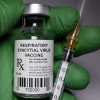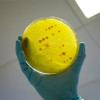
 Mr. Swapnil Bhowmick
Mr. Swapnil Bhowmick
All You Need To Know About Food Poisoning | Medtalks
All You Need to Know about Food Poisoning
What is Food Poisoning ?
Food borne sickness, sometimes known as food poisoning, is caused by consuming infected, damaged, or poisoned food. Nausea, vomiting, and diarrhea are the most frequent symptoms of food poisoning. Food poisoning is not uncommon, despite how unpleasant it is. According to the Centers for Disease Control and Prevention (CDC), 48 million people (or roughly one out of every seven) get food poisoning each year in the world . 128,000 of the 48 million individuals are hospitalized.
Symptoms of Food Poisoning
If you have food poisoning, it is unlikely that they will go unnoticed. Depending on the source of the illness, symptoms may differ.
A few of the following symptoms are common in cases of food poisoning:
Abdominal cramping
Diarrhea
Nausea
Vomiting
Appetite loss
Slight fever and weakness
Headache
Symptoms of potentially fatal food poisoning include:
Diarrhea that lasts more than three days
A temperature of more than 102°F (38.9°C)
Signs of extreme dehydration including
trouble seeing or speaking
dry mouth
passing little to no pee
bloody urine
If you see any of these symptoms, contact a doctor or seek medical attention right away.
How long does Food Poisoning last?
The length of time it takes for symptoms to appear depends on the source of the infection, but it can range from as little as 30 minutes to as long as 8 weeks. With or without treatment, most cases will resolve in 1 week.
Causes of Food Poisoning
Most food poisoning can be traced to one of three major causes: bacteria, parasites, or viruses. These pathogens can be found on almost all of the food humans eat. However, heat from cooking usually kills pathogens on food before it reaches our plate. Foods eaten raw are common sources of food poisoning because they don’t go through the cooking process.
Occasionally, food will come in contact with the organisms in fecal matter or vomit. This is most likely to occur when an ill person prepares food and doesn’t wash their hands before cooking. Meat, eggs, and dairy products are often tainted. Water may also be polluted with pathogenic organisms.
Bacteria
By far the most prevalent cause of food poisoning is bacteria. Bacterial food poisoning causes include:
E. coli, especially those that produce Shiga toxin (STEC)
Listeria monocytogenes
Salmonella
Clostridium botulinum
Campylobacter
Staphylococcus aureus
Shigella
Vibrio vulnificus
Salmonella is the most common bacterial cause of food poisoning in the United States. Salmonella infection is responsible for an estimated 1,350,000 instances of food poisoning each year, including 26,500 hospitalizations. Campylobacter and Clostridium botulinum are two lesser-known but potentially fatal bacteria that can be found in our food.
Parasites
Food poisoning caused by parasites is less prevalent than food poisoning caused by bacteria, yet parasites transferred through food are nonetheless extremely deadly. They are as follows:
Toxoplasma gondii
Taenia saginata
Giardia lamblia
Taenia solium (pork tapeworm)
Other tapeworms
T. saginata (beef tapeworm)
Diphyllobothrium latum (fish tapeworm)
Cryptosporidium
Ascaris lumbricoides is a form of roundworm fluke (flatworm), which includes pinworms of the Opisthorchiidae (liver fluke) and Paragonimus (lung fluke) families
Enterobiasis Trichinella.
Toxoplasmosis is a leading cause of mortality due to food poisoning in the United States, according to the CDC. Toxoplasma gondii has also been discovered in cat litter boxes.Parasites may reside in your intestinal tract for years unnoticed. People with weakened immune systems and pregnant women are more likely to experience severe side effects if certain parasites establish a home in their intestines.
Viruses
Food poisoning can also be caused by a virus, such as the following:
Norovirus, often known as the Norwalk virus
Rotavirus
Astrovirus
Sapovirus
Treatments for Food Poisoning
Food poisoning is frequently treatable at home. Here are a few things you can do to assist cure food poisoning:
Keep yourself hydrated
It is critical to stay hydrated if you have food illness. Electrolyte-rich sports beverages can be beneficial. Fruit juice and coconut water can aid with tiredness and carbohydrate replenishment.Caffeine, which can irritate the digestive tract, should be avoided. Decaffeinated teas containing calming herbs like chamomile, peppermint, and dandelion may help soothe an upset stomach. More stomach distress cures may be found here.
Utilize over-the-counter (OTC) drugs
OTC drugs like loperamide (Imodium) and Pepto-Bismol can help you manage diarrhea and decrease nausea. However, you should consult a doctor before using these medications because the body uses vomiting and diarrhea to eliminate the toxin. Furthermore, using these medications may mask the severity of your illness, causing you to delay seeking professional help.
Take prescribed medication
Pyrantel pamoate (Reese's pinworm medicine) is a popular pinworm treatment.Take your prescribed medications. Although many cases of food poisoning resolve on their own, depending on the organism responsible for their sickness, some patients may benefit from prescription drugs.
Antibiotic Therapy
Antibiotic treatment during pregnancy aids in the prevention of infection transmission to the unborn child.
If you need prescription drugs, your doctor may recommend one of the following regimens for the following illnesses:
Albendazole (Albenza) or mebendazole (Enverm) are antiparasitic drugs for A. lumbricoides and enterobiasis (pinworms).
Campylobacter: azithromycin (Zithromax) is a specific antibiotic.
Cryptosporidium: nitazoxanide (Alinia), an antiparasitic drug used to treat cryptosporidium-caused diarrhea.
Praziquantel (Biltricide), an antiparasitic drug, is used to treat D. latum (fish tapeworm).
Nitazoxanide (Alinia) for G. lamblia.
Tinidazole (Tindamax), an antibiotic and antiparasitic drug, metronidazole (Flagyl), paromomycin, quinacrine, or furazolidone.
Opisthorchiidae (liver fluke): praziquantel (Biltricide) or albendazole (Albenza)
L. monocytogenes: ampicillin
Praziquantel (Biltricide) or the antiparasitic medication triclabendazole (Egaten) for paragonimus (lung fluke)
Shigella is treated with the medications azithromycin (Zithromax) or ciprofloxacin (Cipro)
T. saginata (beef tapeworm): Off-label treatments for T. saginata include praziquantel (Biltricide) or albendazole (Albenza).
T. solium (pork tapeworm): praziquantel (Biltricide) or albendazole (Albenza), which are off-label treatments for T. solium
T. gondii: a combination of the antiparasitic medication pyrimethamine (Daraprim) and an antibiotic such as sulfadiazine, or the antibiotic spiramycin as a standalone medication.
Trichinella: albendazole (Albenza) or mebendazole (Enverm).
Antitoxin Therapy
A C. botulinum infection is considered a medical emergency. Seek medical attention as soon as possible.If you have C. botulinum, a doctor will give you an antitoxin. Babies will be given a specific antitoxin known as BabyBIG (botulism immunoglobulin).
Adequate Rest
It is also critical for individuals suffering from food illness to obtain plenty of rest.If your situation is critical, in extreme cases of food poisoning, you may require hospitalization for intravenous (IV) fluid hydration.In the most severe cases of food poisoning, you may need to stay in the hospital for a longer period of time to recover. Severe instances of C. botulinum, which are uncommon, may necessitate artificial ventilation.
What to Eat & Drink during Food Poisoning
It's advisable to avoid solid foods until the diarrhea and vomiting have subsided. Instead, gradually go back to your usual diet by eating or drinking bland, low-fat foods that are easy to digest, such as:
Crackers with salt
Gelatin
Bananas
Rice
Oatmeal
Bland potatoes
Boiled Vegetables
Diluted fruit juices
Chicken broth
Soda (decaffeinated)
Ginger ale or root beer
What foods to stay away from
Even if you believe you're feeling better, try to avoid the following harder-to-digest meals to keep your stomach from becoming even more upset:
dairy products, particularly milk and cheese
foods high in fat
foods that are fried
meals that are heavily seasoned
spicy meals
meals with a high sugar content
You should also avoid:
caffeine
alcohol
nicotine
How is Food Poisoning Diagnosed?
Based on your symptoms, a doctor may be able to determine the type of food poisoning you have.In severe cases, blood tests, stool tests, and tests on the food you ate may be performed to determine what caused the food poisoning. A urine test may also be used by a doctor to determine whether you are dehydrated as a result of food poisoning.
Food Poisoning Risk Factors
Food poisoning may affect anyone. Statistically, virtually everyone will have food poisoning at least once in their life.Some populations are more vulnerable than others. These are some examples:
Immunocompromised individuals: Anyone who has a weakened immune system or an autoimmune condition is at a higher risk of infection and consequences from food poisoning.
Pregnant women: Pregnant women are particularly vulnerable since their bodies are adjusting to changes in their metabolism.
Senior citizens: Adults aged 65 and over are also at a higher risk of acquiring food poisoning. This is due to the fact that their immune systems may be slow to respond to pathogenic germs.
Small children: Children under the age of five are also considered at-risk since their immune systems are not as mature as those of adults. Dehydration caused by vomiting and diarrhea affects young children more readily.
How to Avoid Food Poisoning?
The easiest approach to avoid food poisoning is to handle your food carefully and avoid any potentially dangerous foods.The way some foods are made and processed, they are more prone to induce food poisoning.
Certain foods may contain infectious pathogens that are destroyed during cooking, such as:
meat
poultry
eggs
shellfish
Food poisoning can develop if certain items are consumed uncooked, are not properly prepared, or if hands and surfaces are not cleansed after contact.
Other foods that might induce food poisoning include:
Sushi and other raw undercooked seafood items
Deli meats
Hot dogs that have not been heated or cooked
Ground beef that may contain meat from numerous animals
Unpasteurized milk and cheese,
Packaged juices
Raw, unwashed fruits and vegetables
Take the following precautions to avoid food poisoning:
Before preparing or eating, always wash your hands.
Ascertain that your food is properly packaged and kept.
Cook the meat and eggs well.
Before utilizing anything that has come into touch with raw materials to prepare other items, sanitize it.
Always wash your fruits and veggies before serving them.
The Bottom Line
Food poisoning is on the rise. It is exceedingly unusual for food poisoning to prove fatal, though. While food poisoning is unpleasant, the good news is that most patients recover completely within a few days, even if no medication is given.

Mr. Swapnil Bhowmick
A motivated student of Medicine & Surgery (MBBS) at R. G. Kar Medical College & Hospital, Kolkata, having a knack for reading and composing medical literature. When he's not writing content for MEDtalks, Swapnil is usually looking up the latest trends and innovations in Medicine.














Please login to comment on this article